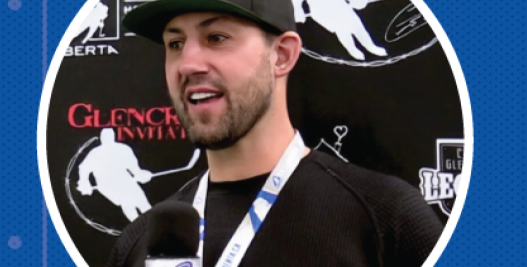Article By: Hockey Alberta
RED DEER, Alta. – Going from being a professional hockey player to retirement can be tough for some athletes.
For former NHL defenceman Cory Sarich, he found a relatively smooth transition from the ice to the broadcast booth.
Sarich played parts of 15 seasons in the NHL with the Buffalo Sabres, Tampa Bay Lightning, Calgary Flames and Colorado Avalanche, suiting up in 969 games, amassing 158 points and over 1,000 penalty minutes while also appearing in 57 playoff games. He won the Stanley Cup in 2004 with Tampa Bay.
He transitioned to the broadcasting world once he retired, making a regular appearance on the Sportsnet telecast as an intermission analyst during Calgary Flames home games.
“I’d had people mention it towards the end of my career. I think conveying my thoughts while on camera, it never seemed to be much of an issue for me,” Sarich said of his post hockey career which also includes a number of charity events, such as Glencross Invitational that took place in October. The charity hockey tournament raises funds for the Hockey Alberta Foundation and Ronald McDonald House Charities® Alberta.
“Maybe it’s because I talk a lot too. Someone told me ‘Hey we think you might be good at filling some air time and filling some dead air.’”

While Sarich has made the move to the media look smooth, he said it wasn’t something that he actively pursued.
“I knew when I was done hockey that I was going to take time for my family. Now I have a bunch of teenagers so I’m starting to have a bit more time on my hands, but it’s not easy, the transition into post career,” Sarich said. “I am at a great spot in my career now, as a freelancer of sorts with Sportsnet. I still have lots of time with my family, and it’s in a great spot. Some athletes are very prepared, some are a little more unprepared, but you just kind of roll with the punches after your career is done.”
While making that career move wasn’t planned or necessarily thought out, Sarich always had a lot of respect for those who did the job while he was playing.
“At times you have different relationships as a player with the media. At times you think they know nothing and other times you think ‘you know what they can help boost my career,’” Sarich said. “I always tried to treat people with the utmost respect, and it always seemed very interesting to me. The way that they come up with stories, the time and commitment they put into following one specific team, players, whatever it is.
He said he was also fortunate to have some quality people help him with the move to the other side of the microphone.
“I was fortunate enough to be given a chance by the likes of Roger Millions. Ryan Leslie has put some faith in me, so it’s been an easy transition,” Sarich said. “Especially when you’re talking about the sport of hockey. I’m just trying to learn every day from the professionals. As a player you only get to see one side of it, but now that I’m on the other side, you see the prep work … you can’t just talk about the game itself. You’ve got to dig up stories and have a relationship with the players. You also must find the balance between being complimentary and critical.”
Hockey and broadcasting have more similarities than the average person might recognize, starting with pre-game preparation.
“As a player I was always prepared and you need to be prepared going on TV or radio, just so you aren’t tripping over your own tongue,” Sarich said. “There are some other things that are similar between the two … poise, thinking on your feet, teamwork. It might be Ryan Leslie kicking me under the table, telling me to get out, I’m taking too long, and we need to go to break or bailing me out when that thought doesn’t come into my head. So, there’s a lot of similarities between the two and I’m really enjoying myself.”
 Visit HockeySask.ca
Visit HockeySask.ca
